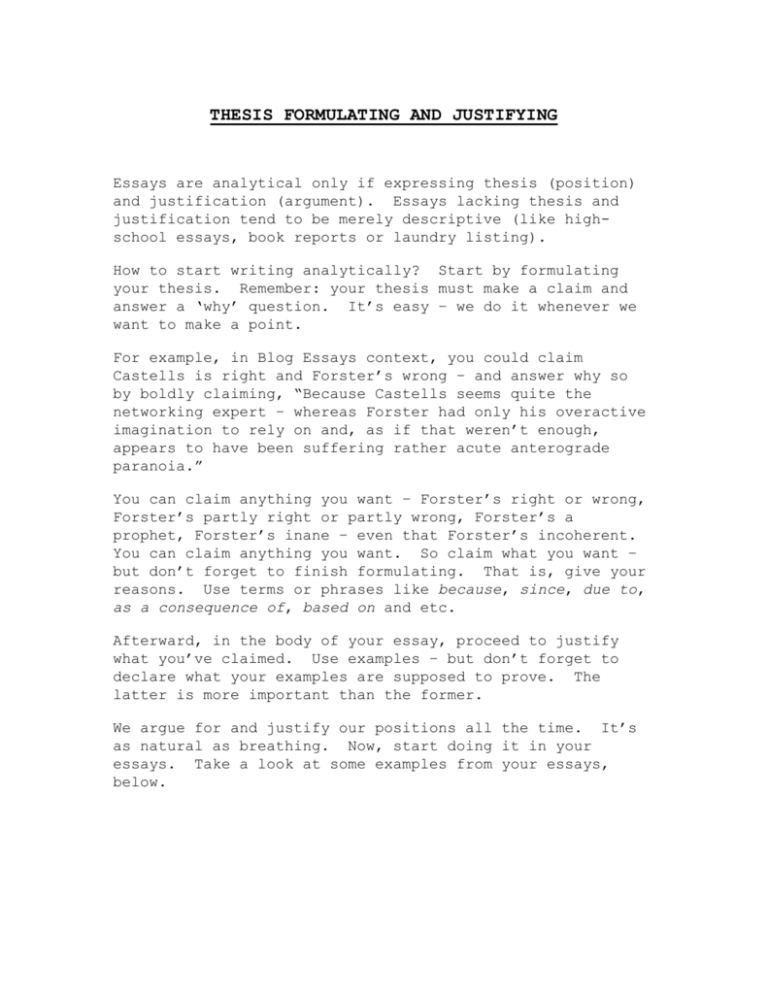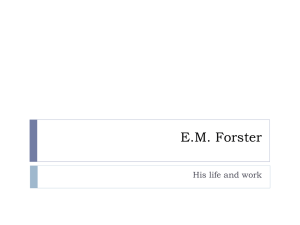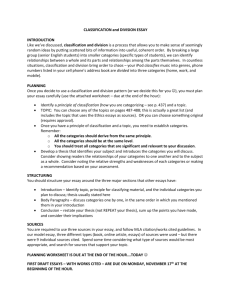Formulating a Thesis
advertisement

THESIS FORMULATING AND JUSTIFYING Essays are analytical only if expressing thesis (position) and justification (argument). Essays lacking thesis and justification tend to be merely descriptive (like highschool essays, book reports or laundry listing). How to start writing analytically? Start by formulating your thesis. Remember: your thesis must make a claim and answer a ‘why’ question. It’s easy – we do it whenever we want to make a point. For example, in Blog Essays context, you could claim Castells is right and Forster’s wrong – and answer why so by boldly claiming, “Because Castells seems quite the networking expert – whereas Forster had only his overactive imagination to rely on and, as if that weren’t enough, appears to have been suffering rather acute anterograde paranoia.” You can claim anything you want – Forster’s right or wrong, Forster’s partly right or partly wrong, Forster’s a prophet, Forster’s inane – even that Forster’s incoherent. You can claim anything you want. So claim what you want – but don’t forget to finish formulating. That is, give your reasons. Use terms or phrases like because, since, due to, as a consequence of, based on and etc. Afterward, in the body of your essay, proceed to justify what you’ve claimed. Use examples – but don’t forget to declare what your examples are supposed to prove. The latter is more important than the former. We argue for and justify our positions all the time. It’s as natural as breathing. Now, start doing it in your essays. Take a look at some examples from your essays, below. "The premise that society is becoming dependant on machines to such a great extent that the machines are replacing God and all forms of nature is the central theme of E.M Forster’s ‘The Machine Stops’. This idea relates directly to how Castells describes societies need to be networked with technology in order for humanity to progress." What’s your thesis? Yes, Forster and Castells’ ideas may be related. So: declare how you relate them. How does Castells agree – or disagree – with Forster? Then, justify what you’ve declared. Is Castells right to agree – or disagree – with Forster? Why – or why not? “The machine.. is a good metaphor for new media in that it embodies its central issues as set forth by Wendy H.K. Chun..” Don’t declare what someone else says as your thesis. Forster’s right because Chun says so? Fine – but what do you say? What’s your thesis? “.. the author does bring up some interesting points in how ‘new media’ can be quite detrimental in the progress of humanity if we are not careful of its presence in our day to day livelihood.” It’s true, what you say Forster says. It’s all true. But you’re not writing a book report. You’re writing an analytical essay. So what’s your thesis? It’s not enough, saying (only) what Forster says. What do you say? Is Forster right saying what he says – and, if so, why is he right? “It is clearly obvious that in today’s day and age, computers or machines play a huge role in our daily lives, and thus we find ourselves submitting to technology…” There’s a thesis in there – but not very clear. Your phrase “submitting to technology” suggests technology is chiefly harmful. Well, don’t just suggest it – declare it in your introduction. Say it loud and clear. Trumpet your thesis. Then, proceed to justify it in the body of your essay. What does Forster say about it? What does Castells say? Why are they right – or wrong – to say so? And one more thing: avoid phrases such as “it is (clearly) obvious” or “it is apparent” or “it is indisputable”. Because when you say “it’s obvious” you’re saying you don’t have to explain or justify it – everyone already knows. It’s just obvious. No need to justify it. But what are jobs 1 and 2 in an analytical essay? You got it: trumpeting your thesis/position and justifying your thesis/position. “.. tools themselves certainly do not make us less social or cause us to loose skills or our identity. Our abuse of technology is the confounding variable. A pattern seems to exist: we create new tools, abuse our usage of them and in turn must create a new tool to “fix” the problem.” Your thesis sounds terrific – and clear. Don’t hesitate to tools don’t abuse us. To the abuse ourselves – and use our abuse.” yet remains needlessly ambiguous. Say it loud hammer it all the way home. For instance: “Our contrary. We abuse ourselves with our tools. We tools to ensure there’s no recovering from the “.. in Castells’s text the power of technology is a tool that will set us free, but in Forster’s text it is a prison in which we live and it will destroy humanity. Both authors have compelling arguments.” They sure do, don’t they? They’ve done their job. Now you’ve got to do yours. So get off the fence, take a position and trumpet your thesis. They can’t both be right if they disagree as fundamentally as you say. Pick a side. Take a position. And don’t wait to declare the position you’ve taken until the end. Declare it right up-front. It’s an analytical essay you’re writing – not a murder mystery. “‘The Machine Stops’ represents the limitations brought upon us by technology, while ‘Why Networks Matter’ discusses the idea that humans hold the power to change the structures of society, and that technology is important to collective advancement. Both of the authors are correct in their interpretations since new media has created a dualistic state of affairs.” Oh… So you say both authors are right despite their fundamental disagreeing. Well, it’s arguable. But, right or wrong, whether or not you manage to justify your thesis, you could not have said it any clearer. Terrific. “The machine in "The Machine Stops" is a good metaphor for new media because people desire new forms of technology that are faster and require less man power, new media encourages unnatural selection in our society, and is leading towards social instability.” Fairly clear – though awkward. Listing all particulars due which you think Forster’s right is premature in introduction. Get punchy with your thesis. For instance: “Forster’s vision was true. (since) We are indeed addicted to technology as if characters in his story.” Then, in the body of your essay, proceed elaborating particulars of our addiction to technology – and justifying significance of the particulars you elaborate. “According to Forster, in his story “Machine stops”, humans are powerless. Human life is completely dependent on the machine. But I think we are dependent on technology to a certain extent, but not completely. I agree with Castells, where power is with us. Network is an extension of our nervous system, mind, senses etc.” Clear introduction. Loud and clear – however awkward grammatically. That’s trumpeting your thesis. Now all you’ve got to do is justify why you think Castells’ right and Forster’s wrong. “I agree with Manuel Castells’s opinion of networks because it relates more to the present day, and how networks work now. E.M. Forster’s idea of how networks work seems very dark and unrealistic to the modern view..” Perfectly clear. Repeat. Done. Castells is right. Forster doesn’t have a clue. Justify.







